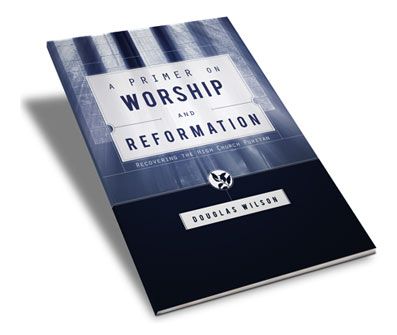Apr
10
2009
“What you are actually becoming in public is a public revelation of your true worship. What many call a ‘midlife crisis,’ for example, is simply idolatry catching up with a person.”
Doug Wilson, The Spirit of Accusation, Sermon Podcast, 7 January 09. Subscribe at www.christkirk.com
Comments Off | tags: Doug Wilson, Worship | posted in Quotes
Apr
10
2009
In C. S. Lewis’ The Voyage of the Dawn Treader, we are given a good example of a boy who was brought up poorly. Eustace Scrubb had stumbled into a dragon’s lair, but he did not know what kind of place it was. “Most of us know what we should expect to find in a dragon’s lair, but, as I said before, Eustace had read only the wrong books. They had a lot to say about exports and imports and governments and drains, but they were weak on dragons.”
It is a standing rebuke for us that there are many Christians who have an open sympathy for the “true” books which Eustace read — full of true facts about governments and drains and exports — and who are suspicious of great works of imagination, like the Narnia stories, or The Lord of the Rings, or Treasure Island, because they are “fictional” and therefore suspected of lying. The Bible tells us to be truthful above all things, they tell us, and so we should not tell our sons about dragon-fighting. Our sons need to be strong on drains and weak on dragons. The irony here is that the Bible, the source of all truth, says a lot about dragons and giants, and very little about drains and exports.
–Doug Wilson, Future Men, p. 101.
Comments Off | tags: C. S. Lewis, Doug Wilson, Parenting | posted in Christian Life, Quotes
Apr
10
2009

The great argument advanced today in favor of such seeker sensitive worship is that we have to present the gospel to today’s unbeliever in a way that is relevant to him. But the word relevance, though it has a fine dictionary definition, really has to be understood as the battle cry of modern unbelief. This is not because the word itself is objectionable, but because liberals and their modern evangelical cousins have freighted it with a hidden system of weights and measures—in which the world, and not Scripture, determines the content of our faith and practice.
There are at least two kinds of irrelevance. One is the irrelevance of offering a bicycle to an oyster. But there is another kind of irrelevance entirely, and that is the practice of setting forth the gospel of light and righteousness to those who love their darkness and iniquity. We are commanded to be irrelevant in this second sense. We are called to worship God in a way that is pleasing to Him, and to which unbelievers will be attracted only if God moves them in a sovereign and mysterious way.
Read chapter 1, They Will Know We Are Christians By Our Schlock, here.
Comments Off | tags: Doug Wilson, Ecclesiology, Power of the Gospel, Worship | posted in Christian Life
Apr
10
2009
“…the Church is our mother, and the law of God requires us to honour our mothers.”
– Douglas Wilson, Mother Kirk, p. 23.
Comments Off | tags: Doug Wilson, Ecclesiology | posted in Christian Life
Apr
10
2009
As parents, teachers, elders, pastors, and as those in authority, we tend to fall into one of two errors as we seek to guide those who have been placed under our authority. One error is to be far too easily pleased. The other is to become impossible to please. For the former, not only is the glass always half full, but it is reckoned to be completely full because it is half full. For the latter, the glass is always considered to be completely empty because it is always half empty. Both of these approaches are destructive forms of leadership.
And apart from the work of the Spirit in our lives, we tend to fall into one of these two errors. But the work of grace sees what needs to be done, and also sees, in wisdom, what has been done. And the attitude that accompanies this wisdom is that of being extraordinarily easy to please, and extraordinarily difficult to satisfy. This is how our Father God is with us, and this is how we should be with one another. We don’t want to be easy to please and easy to satisfy. Neither do we want to be impossible to please and impossible to satisfy. The former type of parent produces well-boiled noodles. The latter gives us neurotic dry twigs, ready to snap.
To you as a congregation, how does this apply? God is extremely pleased with you, and with how far you have come. Is He satisfied? Not even close. We are still on pilgrimage, and are not yet conformed to the image of Christ.
Douglas Wilson, www.dougwils.com
Comments Off | tags: Doug Wilson, Parenting | posted in Christian Life, Quotes
Apr
10
2009
“…the historic Protestant Church must reassert her prerogatives with regard to keeping the oracles of God. The rights to market the Bible were not sold by the Holy Spirit to Rupert Murdoch, the current owner of Zondervan. How in blue blazes did Mammon get the publishing rights to the Word of God? Who was involved in the transaction, and why hasn’t he been publicly flogged?”
– Doug Wilson, Mother Kirk, p. 59-60.
Comments Off | tags: Doug Wilson, Protestantism | posted in Quotes
Apr
10
2009
“We are not born desiring truth, but rather milk. Truth is not found primarily through the reflections of trained philosophers and scientists. It is found primarily through faithful mothers diligently spanking bottoms. We are designed and created by God to grow up into truth. The idea that we could ever dispassionately approach the search for truth with a detached Cartesian spirit is an idea which dies hard. We must learn our theology and worldview from the high chair, and, more than this, we must learn that this is how we are supposed to learn them.”
Angels In The Architecture, by Doug Wilson and Doug Jones, p. 188-189.
Comments Off | tags: Doug Jones, Doug Wilson, Presuppositions | posted in Christian Life, Quotes
Apr
10
2009
Beasts and Antichrists
“Scripture describes for us the sin of being antichrist, the Greek word being antichristos. There are four uses of the word in 1 John, and one in 2 John, and that’s it for the Bible. Surprising to many, the antichrist is not found in the book of Revelation at all. The recipients of John’s letter had heard that the antichrist was going to come, and indeed, John says, many antichrists had already come (1 Jn. 2:18). The antichrist is defined as one who denies the Father and the Son (1 Jn. 2:22). And the spirit of antichrist is a refusal to confess that Jesus Christ had come in the flesh (1 Jn. 4:3). The same thing is said again in 2 Jn. 1:7. The spirit of deception and antichrist is a rejection of Jesus come in the flesh.
So what is the sin of being an antichrist. Through long-standing misunderstandings about eschatology, the definition of this sin has gotten almost completely distorted. A common understanding is to see The Antichrist and The Beast as the same character out of poorly written end times novels. But this is not the case at all. In Scripture, a beast is a civil ruler, persecuting the Church. An antichrist is a false teacher from within, one infected with all the latest ideational leprosy. For a beast, think Stalin, Hitler, Nero. For an antichrist, think of a mild, soften-spoken Anglican bishop — one who denies that Jesus was God enfleshed.” www.dougwils.com
The distinction is between fallen Adam and the serpent. Ezekiel sarcastically called the bejewelled high priest the “King of Tyre” and the worship “Queen Sidon” – but they were still human, still “Adam”, still worshippers. In Revelation, however, the fallen priesthood was no longer human, but a beast, ie. political. A dragon with lamb’s horns and a speaking “graven image” picture a very different sort of idolatry.
Comments Off | tags: antichrist, Doug Wilson, Revelation, Tyre | posted in Biblical Theology
Apr
10
2009
 A comment from David Hagopian on the recent pub debate between atheist Christopher Hitchens and Pastor Doug Wilson:
A comment from David Hagopian on the recent pub debate between atheist Christopher Hitchens and Pastor Doug Wilson:
There was a moment when Hitchens hit Doug with the old, “Jesus didn’t fulfill his words in Mathew 24.” It was an amazing response by Doug. Very authoritative on this section of Scripture being a description of the destruction of the temple in A.D. 70. Really powerful. You could hear multiple pin drops in the room between Christopher and Westminster profs and students. The hair on my arms stood up. Hitchens was stunned. He never again in debates brought up Scripture. Powerful stuff.
Gary DeMar writes:
“Can you imagine how a futurist would attempt to deal with Matthew 24? “Well, Jesus didn’t really mean ‘this generation,’ that is, that first-century generation. He was really referring to a future generation. Yes, ‘this generation’ does always mean the generation to whom Jesus was speaking everywhere else in the gospels, but it doesn’t mean that here. It might mean ‘race’ or ‘a future generation that sees these signs.’” Instead of hearing pins drop, there would have been out-loud laughing and dismissal.”
Full article here.
Comments Off | tags: Apocalyptic, Atheism, Doug Wilson, Gary DeMar | posted in Biblical Theology, Quotes, The Last Days
Apr
10
2009
What is the condition of man apart from Christ, and what salvation is offered to us in that condition? The Word of salvation does not come to sinners who are ailing. It comes to sinners who are dead. It does not come to those who have anything to contribute to the process of resurrection. When Jesus raised Lazarus from the dead, He was not pulling while Lazarus pushed. Before the word of life comes to us, before the breath of God is breathed into us, our condition is hopeless.
We are in the grip of carnal hatred. Without Christ, what does the mind of man do? Where does it gravitate? “Because the carnal mind is enmity against God: for it is not subject to the law of God, neither indeed can be” (8:7). Described another way, this condition of hatred is a form of death, and it is a death that reigns. Apart from Christ, sinners are dead — not sick. “And so death passed upon all men, for that all have sinned” (Rom. 5:12). Again, the image here should be that of Lazarus in the tomb. How much did he contribute to his resurrection?
Doug Wilson www.dougwils.com
Comments Off | tags: Doug Wilson, Resurrection | posted in Biblical Theology, Quotes



























